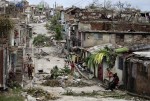Students dipped their hands into paint and pressed onto a white wooden board, creating an array of rainbow-colored handprints.
The “Solidarity Wall,” aimed to draw attention to the UCLA Students for Haiti Solidarity, a club founded in 2015, and its efforts to help victims of Hurricane Matthew in Haiti.
Meghan McDermott, co-founder of the club and a third-year mechanical engineering student, said she originally founded the club to raise funds for Haitian high school students who want to go to college.
The club also visits Haitian cities during spring break to learn about the students’ experiences.
However, the club has temporarily shifted its focus to help provide immediate aid to families displaced by Hurricane Matthew.
[Related: Alum’s Haiti volunteer experience during school unlocks lifetime career]
More than a million people need food assistance after the hurricane because it destroyed acres of crops, according to the New York Times. There have also been cholera outbreaks, which citizens fear may develop into an epidemic.
The club launched an online campaign this month to raise money for supplies they will send to Haitian citizens, McDermott said. Members hope to send Port-au-Prince food, water, chlorine to disinfect water and metal sheets to help build temporary houses.
The club aims to raise $2,400 to send at least 20 kits to Port-au-Prince. Lauren Schusterman, a fourth-year international development studies and geography student, said the kits of food, water, chlorine and metal sheets will cost $120 each.
Members will send the kits directly to Rea Dol, the head of the school they work with outside Port-au-Prince, who will help distribute them.
McDermott said she thinks the difference between the UCLA Students for Haiti Solidarity and other nonprofit organizations is that the club sends all of its donations to Haiti and focuses on long-term problems, not just short-term relief.
It has been nearly three weeks since the hurricane passed through the country, but some citizens fear the long-term effects, such as disease, permanent displacement and food shortages that may follow, according to the Los Angeles Times.
“They have to rebuild their economy, healthcare system and education system, and passing out water bottles cannot always solve that,” McDermott said.
Club members said the organization communicated constantly with their contacts in Haiti to better understand what supplies they needed.
McDermott added she thinks money should go directly to Haitians, rather than foreigners, so that the citizens have more control over how the aid is allocated.
Robin Derby, director of the Caribbean Program at the UCLA International Institute and expert on the social history of Haiti, said she thinks aid organizations should give money and assistance to local organizations.
“We have to help organizations already on the ground there,” Derby said. “Haiti has an incredible infrastructure of civil society and would be able to direct the resources in an efficient way.”
Derby said people should not donate solely through the American Red Cross, because the organization doesn’t always implement long-term solutions. She recommended two global organizations, Partners In Health, which previously stimulated the Haitian economy by hiring Haitian doctors to combat disease, and Heifer International, which donated livestock to help reestablish the agricultural aspect of the country.
[Related: UCLA students visit Haiti, assist local health center]
She added she thinks these organizations promote the long-term goals necessary for Haiti to begin rebuilding itself.
McDermott said she thinks many club members are enthusiastic and passionate for the projects because of their previous interactions with Haitian students during the spring break trip.
“Each of the high schoolers we are trying to help talks about how they want to help change their country for the better,” McDermott said. “If they can create change despite their current living conditions, we can’t be intimidated and stay idle.”
